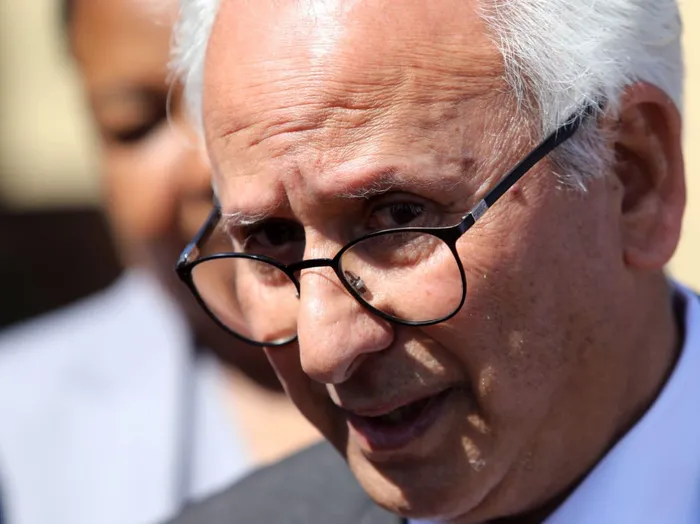Organised crime wearing designer suits, fueled by greed, says Cachalia | Crime Stats

Acting Police Minister Firoz Cachalia.
Image: Oupa Mokoena
Acting police minister Professor Firoz Cachalia has voiced concern that organised crime networks - often disguised in “designer clothes and fancy suits” - are infiltrating political parties and state institutions, posing a growing threat to national security and public trust.
Cachalia was speaking in Pretoria on Friday as he released the second-quarter crime statistics for 2025.
He said that while the government continues to analyse the causes of crime, “crime and violence are always unacceptable”.
“Government departments in the social clusters, as well as provincial and local governments, have important roles to play. We must invest in initiatives to ensure our children are well fed, and our youth have opportunities, so that we can prevent crime,” he said.
He added that while some people commit crime out of desperation, others act out of “greed and a lust for power and wealth”, establishing criminal structures that divert public funds and bring drugs and weapons into communities.
“Combating gang violence requires effective, no-compromise policing, with strong investigation and prosecution. We must ensure that the ganglords pay for the harm done to our society and the future of our country,” he said.
Cachalia identified three core priorities for the ministry, these include tackling organised crime, professionalising the police service, and accelerating the implementation of the Integrated Crime and Violence Prevention Strategy.
He said organised crime poses a direct threat to public safety, economic growth and national security.
“Criminal networks fuel violence, entrench corruption and weaken democratic institutions. Organised crime undermines investment and prevents job creation,” he said.
He highlighted the devastating impact of drugs on communities and young people, as well as the immediate effect of kidnappings, vehicle hijackings, gang violence and cash-in-transit heists on residents and small businesses.
“These criminals, as we have seen recently, wear fancy suits and designer clothes, pretending they are legitimate businesspeople,” he said.
Cachalia pointed to the importance of the Madlanga Commission and the Parliamentary Ad Hoc Inquiry, which are investigating allegations of criminal networks influencing elected political leaders and senior police officials.
This follows the appearance of a murder-accused businessman, Vusimuzi “Cat” Matlala alleged to be linked to a crime cartel - who arrived at the committee in expensive designer clothing.
“We have seen the damage that state capture has done to our country and its institutions, and we now know that capture continues in different forms,” he said.
He also pointed to the large-scale theft of funds from the Gauteng Health Department affecting Tembisa Hospital.
He said that many damaging crimes do not appear in crime statistics, which is why he chose to highlight them.
“Tackling organised crime and its associated corruption must be a national priority,” he said, calling for specialist capabilities and closer collaboration between the police, prosecutors, regulators, SARS and the private sector.
“Follow the money and hit the criminals where it hurts - in their pockets.”
He emphasised the need for fast, effective prosecutions and strong witness protection.
Cachalia said a well-resourced integrated strategy to combat gang violence is now in place in the Western Cape, Eastern Cape, Gauteng and KwaZulu-Natal.
Although progress remains limited, early signs of improvement are emerging, particularly in the Western Cape, where prosecutors and detectives are now working together on case dockets.
He also pointed to strengthened cooperation between community leaders and provincial police management.
Cachalia will visit the Western Cape in the new year to meet with government officials, community structures and police leadership, including Premier Alan Winde, to ensure alignment across national, provincial and local spheres of government.
He said that gang activity is also intensifying in parts of Gauteng, including Westbury.
His second priority is professionalising the police service to rebuild public trust.
“This speaks to concerns about political interference and the abuse of political power, which have harmed the functioning of the police service. We need a professional police service that acts outside the political process, without fear or favour,” he said.
He emphasised the importance of whistleblower protection, noting that the Department of Justice is finalising legislation.
“When policing is inconsistent, corrupt or abusive, public fear grows, cooperation collapses and crime thrives,” he said.
“There must be no doubt about the integrity of those who lead the South African Police Service.”
He stressed that the allegations prompting President Cyril Ramaphosa to appoint the Madlanga Commission involve only a small number of individuals.
“Most of the 187,000 employees of the SAPS are doing their best under extremely difficult conditions,” he said.
Cachalia welcomed internal strengthening efforts and highlighted private-sector partnerships through the Joint Initiative on Combating Crime and Corruption (JICC).
He also thanked Business Against Crime South Africa and Business Leadership South Africa for supporting the modernisation of police stations, a project currently in its pilot phase, and for assisting in efforts to strengthen border security.
He said public trust can be restored only when the integrity of officers is unquestionable. He praised a Directorate for Priority Crime Investigation (DPCI) officer who recently refused a R100,000 bribe related to the Tembisa investigation.
Cachalia also expressed concern over police killings, noting that 41 officers had been murdered in the past six months - 35 of them off duty - highlighting the dangers they face even when not in uniform.
“We must and will do more to improve the safety of our officers,” he said.
Cachalia’s third priority is implementing the Integrated Crime and Violence Prevention Strategy, which focuses on prevention as well as enforcement.
“All of us know the conditions in our communities that allow crime to take root,” he said.
The strategy’s seven priorities include early childhood development, reducing gender-based violence, creating safe public spaces through urban design, combating substance abuse, strengthening local government capacity, rehabilitating offenders and improving coordination and data accountability.
IOL News